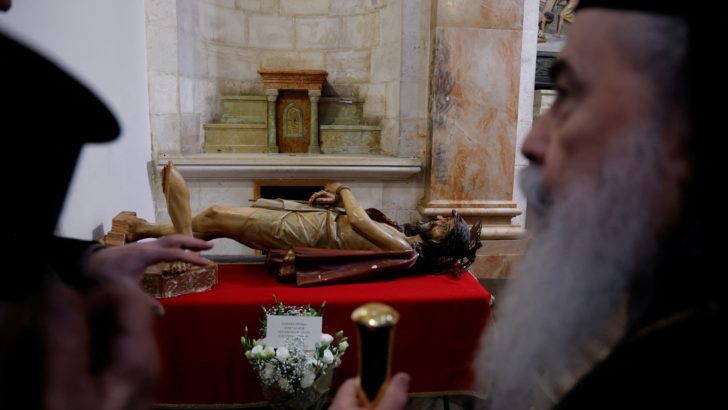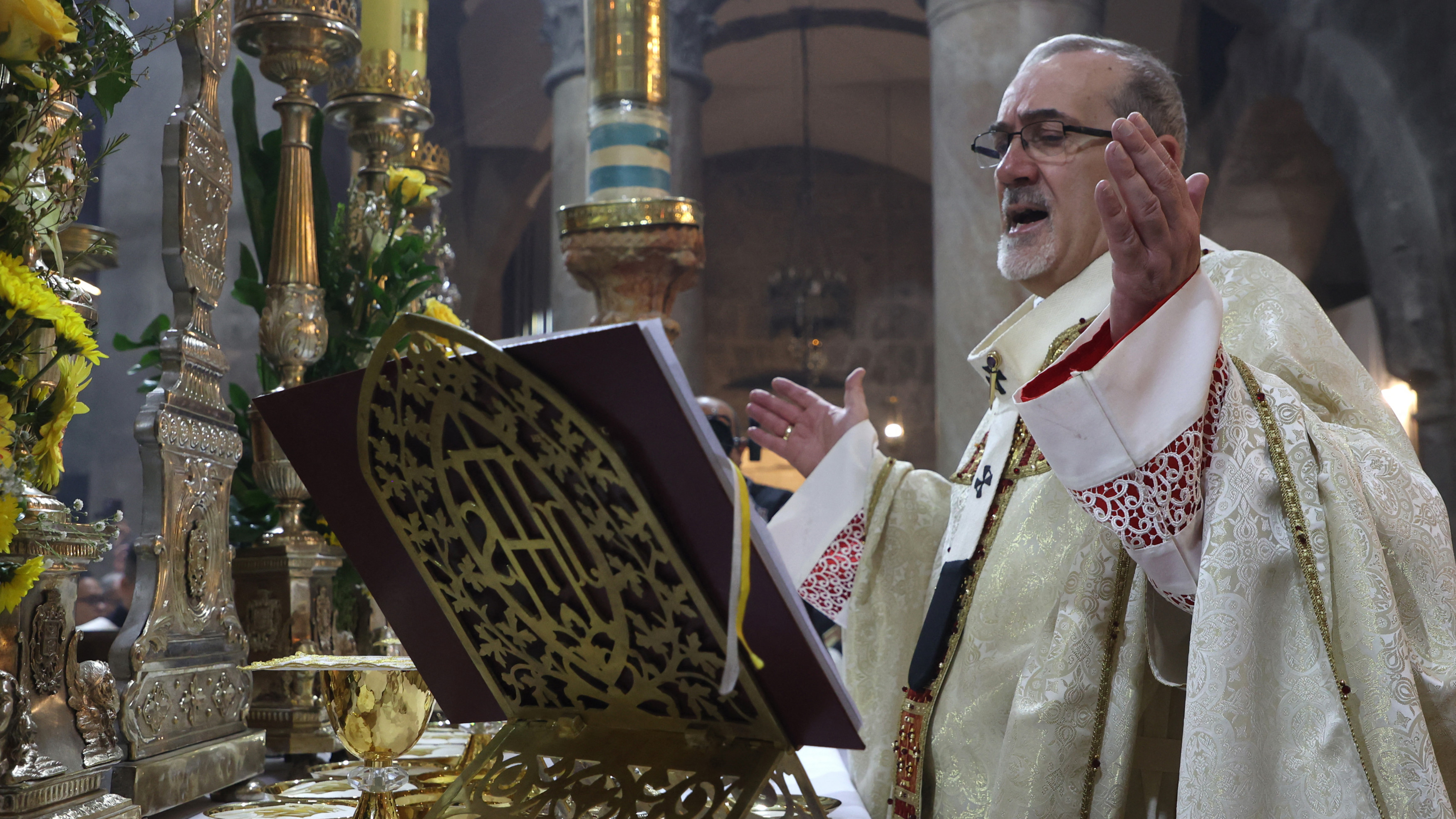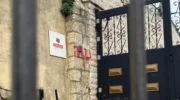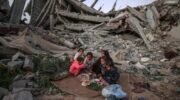Emboldened by an ultranationalist government promoting Jewish supremacy, young Israelis are increasingly targeting Christians in the holy land with hate crimes
By Lily Galili in Tel Aviv, Israel, reposted from Middle East Eye
Pierbattista Pizzaballa, the Latin Patriarch of Jerusalem, was taken by surprise when he learned that Pope Francis elevated him to the high rank of cardinal last month.
The archbishop, who recently warned against rising Israeli attacks on Christians in the birthplace of Christianity, interpreted it as “a sign of attention from the Church of Rome towards the Mother Church, the Church of Jerusalem”.
The nomination, the first extended to the Latin Patriarch of Jerusalem since the patriarchal seat was re-established in 1847, is perceived as a clear statement by the Pope against rising Israeli violence in the Holy Land.
It came in the wake of the two-day Israeli military raid in the occupied West Bank city of Jenin, which left widespread destruction and 12 Palestinians killed.
“With sorrow, I learned again that blood has been poured out in the Holy Land,” the Pope said in the address, which was followed by Pizzaballa’s nomination to cardinal among 21 others.
Pizzaballa – who holds authority over Catholic churches in Cyprus, Jordan, Israel and the occupied West Bank and Gaza as the Latin Patriarch of Jerusalem – was quick to visit Jenin once the Israeli attacks stopped, inspecting the damage done to the Latin church in the city during the assault.
As the attack unfolded on 3 and 4 July, the cardinal-elect denounced the “unprecedented aggression” by Israel and the “barbaric acts” committed in the process.
But those following Pizzaballa and Pope Francis were not surprised by the unprecedented nomination, for the pontiff has repeatedly referred to the hardships of Christian minorities in the Middle East in recent decades.
“The Latin Patriarch’s nomination as cardinal is a strong message of empowerment to the Christian community in Israel in these difficult times,” Wadie Abu Nassar, the former media spokesperson of the Jerusalem-based Assembly of Catholic Ordinaries of the Holy Land, told Middle East Eye.
The Catholic social activist, who recently co-founded the Forum of Holy Land Christians aimed at promoting Christian interests, said these days he keeps getting asked the same question: about the worsening situation of Christians in Jerusalem and Israel.
Incitement and lack of policing
Abu Nassar is not only referring to the deteriorating geopolitical situation in the occupied territories.
Rather, he is referencing the recent spike in anti-Christian hate crimes, in which an atmosphere of Jewish supremacy in Israel is translating into frequent manifestations of violence against Christians and harassment of clergy.
These include trespassing on churches, spitting on churchgoers, destruction of Christian symbols and vandalising Christian graves, among other acts.
They are committed mostly by young ultranationalist men or settlers, including some soldiers in the Israeli army.
And while such attacks are not new, they have spiked since the new government – described as the most right-wing in the country’s history – took office late last year.
A government whose far-right ministers are accused by critics of fanning the flames of extremist violence with their rhetoric.
Their followers feel protected and emboldened by both the words of their politicians and the indifference of Israeli police, who have been accused of failing to investigate most cases of extremist violence, despite the existence of photos and recordings featuring the perpetrators.
Police have reportedly not been taking the attacks seriously, refusing to treat the incidents as part of a trend and downplaying the motives of attackers by saying they are carried out due to “mental illness”. Police deny allegations of negligence and insist they take reports of assaults seriously.
Security cameras
There are about 185,000 Christians in Israel and occupied East Jerusalem, representing just under two percent of the country’s population.
The vast majority of them are Palestinians living in Nazareth and Haifa, while around 13,000 live in Jerusalem.
The attacks mostly target those living in Jerusalem but affect both Palestinians and the small non-Arab Christian minority living in the city.
Piotr Zelazko, the vicar of St. James Vicariate, serving the tiny community of Hebrew-speaking Roman Catholics, is among those who are disturbed by the new trend.
In Jerusalem, he told MEE that his main concern is the new rhetoric.
“The thing that scares me most is the new language that has entered public discourse,” he said.
“We understand it’s a Jewish state, but when they speak about Jewish supremacy and against minorities – they leave us behind the fence. We do not share the same experience with the Palestinian Christians – but we also fall into the category of ‘the other’.”
Zelazko says that friends from a neighbouring synagogue advised him to hire a security guard for Sunday mass. He refused, but the church now keeps the door closed for latecomers who enter through the garden, just to be on the safe side.
Similarly, while walking through the Old City in Jerusalem, there is a new addition to the landscape that cannot be ignored: security cameras on the Church of Flagellation, an iron gate at the Franciscan academic society centre, protective barbed wire on the Armenian Monastery roof and other electronic surveillance devices.
Israeli-Christian relations
Pizzaballa warned against the uptick in anti-Christian attacks months ago.
In an interview with the Associated Press, the cardinal-elect said the new far–right government had made life worse for Christians, emboldening extremists who harass clergy and vandalise religious property.
“The frequency of these attacks, the aggressions, has become something new,” Pizzaballa said. “These people feel they are protected… that the cultural and political atmosphere now can justify, or tolerate, actions against Christians.”
The interview made headlines across the world in many languages, prompting some to recall a claim by Prime Minister Benjamin Netanyahu which paints a completely different picture.
“There is only one safe place for Christians in the Middle East… That’s in the State of Israel,” Netanyahu said in a 2018 speech delivered to Zionist Christians in Brazil.
This portrayal of a society that takes religious tolerance seriously is central to Israel’s public image, but the reality on the ground has always been something different.
In a 2005 interview, Pizzaballa – then Custodian of the Holy Land – said that Israel failed to understand the sensitivity and importance of the holy places to Christians.
Back then, almost 20 years ago, he suggested that an international presence might be needed to protect Christian sites.
Ahead of Christmas 2021, the new Custodian of the Holy Land Francesco Patton wrote an article in The Telegraph warning that “Holy Land Christians are at threat of extinction”.
This was a year before the new government came to power; a year before the radicals of 2022, who were nothing like the radicals of 2023, were empowered by the new far-right leaders in the corridors of power.
In private conversations, Pizzaballa has said that now it has even become difficult to meet with high-ranking Israeli officials, a problem he never faced before.
The conduct of Israeli officials is surprising, considering how hard Israel worked on establishing diplomatic relations with the Vatican in 1993.
But preserving his ultra-Orthodox and far-right coalition seems now to be of greater importance to Netanyahu, who is embroiled in a trial against him and a deepening internal judicial crisis.
On a recent visit to Israel, the Polish deputy minister of foreign affairs, Pawel Jablonski, addressed the issue: “Another priority of Polish foreign policy is the situation of Christians in Jerusalem and the preservation of religious and cultural heritage in the Holy Land.”
Jablonski met with the Greek Orthodox Patriarch of Jerusalem Theophilos III and discussed with him what was defined as “challenges faced by Christian communities and the potential of increased involvement by Polish diplomacy”.
Deborah Lipstadt, the American special envoy to monitor and combat antisemitism, also met with Christian church leaders on her visit to Jerusalem in June.
She was briefed on the worsening hostile environment against Christians. Following her report, the US office of Palestinian affairs subsequently issued a statement referring to the meeting and the need to protect the religious diversity of Jerusalem.
The ministry of interior, through the religious communities division in charge of non-Jews in Israel, said they continuously work to provide freedom of religion and protect holy places.
“We hope the violent incidents will end immediately,” the ministry spokesperson said in a statement. But hope, in this case, is certainly not enough.
Judaisation
Physical and verbal harassment are not the only disturbing phenomena.
Many Christian leaders believe that those are just manifestations of a far-reaching plan aimed at the Judaisation of Jerusalem’s Old City, with churches being one of many obstacles in the city to be removed.
A new national park planned on the Mount of Olives is of particular concern to the Christian community and local churches. If implemented, the park will be built on church-owned lands belonging to several churches, among them the Greek Orthodox Patriarchate, the Catholic Church and the Armenian Patriarchate.
When first made public over a year ago, under the former government, the local planning committee vowed to promote the plan only in coordination with the churches. Following the outcry, the plan was shelved.
But with the new government in charge putting more effort into entrenching Jewish control over occupied East Jerusalem, churches remain on alert.
Nikodemus Schnabel, the abbot of the Dormition Abbey, is one of the most outspoken Jerusalem clergy against anti-Christian trends.
In an interview with the German daily Suddeutsche Zeitung, he stated bluntly that attacks on Christians increased since “those who hate Christians now sit in government”.
In an interview with America Magazine, he was more specific.
“In 2015, I could say there are these Jewish terrorists [attacking Christians and Christian holy sites], but the official Israel is supporting us,” he said.
“Now we monks have to live under a government, one of whose members is an extreme Christian hater. The minister of national security [Itamar Ben Gvir] was the defence lawyer of the Jewish terrorists who carried out the arson [on a church] in Tabgha…
“How should I feel secure and safe under this government?”
Lily Galili is a senior Israeli journalist and lecturer focusing on all aspects of Israeli society. Formerly with Haaretz daily, now contributor to several media outlets. Galili is a Nieman Fellow from Harvard and a graduate of the Hebrew University in Jerusalem, with a Master’s Degree in communication.
RELATED:
- Israel is not as Christian-friendly as you think
- Anti-Christian incidents are on the rise in Jerusalem’s Old City
- Israeli Soldiers Attack Palestinian Christians during Palm Sunday Procession (VIDEOS)
- Israeli guards called him “the Christian” to insult him, then beat him some more
- Ambitious Mike Pence meets with Miriam Adelson & anti-Christian Israelis connected to terror group
- No, the Bible doesn’t command Christians to “stand with Israel”
- The Scofield Bible: The Book That Made Zionists of America’s Evangelical Christians






